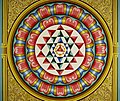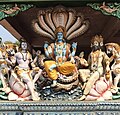Aghor Yoga also referred to as Aghor is a spiritual tradition that originated in Northern India around the 11th Century C.E. The word Aghor literally means...
19 KB (2,539 words) - 14:17, 21 December 2024
Aghora may refer to: The Hindu god Bhairava, a form of Shiva Aghori, a particular school of Hindu Tantra Aghor Yoga, subsect of the Aghora lineage Aghora...
339 bytes (72 words) - 10:59, 1 March 2021
Aghori (redirect from Aghora (sect))
The Aghori (from Sanskrit: अघोर, lit. 'not dreadful', 'dreadless', IAST: aghora) are a monastic order of ascetic Shaivite sadhus based in Uttar Pradesh...
27 KB (2,994 words) - 08:45, 27 December 2024
Tantra (redirect from Tantric Yoga)
worships Svacchanda Bhairava, a terrifying form of Shiva also known as "Aghora" ("not fearsome"). This tradition promotes the Skull observance (Kapalavrata)...
119 KB (14,977 words) - 17:43, 8 December 2024
Bhairava (redirect from Aghora (Shiva))
he is said to protect treasures. He is the main deity worshipped by the Aghora sect. Rakta Bhairava Dancer dressed as Shveta Bhairava from Bhaktapur, Nepal...
23 KB (2,419 words) - 00:47, 27 December 2024
with Shiva as Sadyojata (akin to Brahma), Vamadeva (akin to Vishnu) and Aghora (akin to Rudra). Thus, Brahma, Vishnu and Rudra are not deities different...
15 KB (1,626 words) - 03:53, 1 January 2025
(speech), Atma (Self), and five manifestations of Rudra – Ishana, Tatpurusha, Aghora, Vamadeva, Sadyojata Devas as forces or principles of nature – Prithvi (earth)...
6 KB (594 words) - 10:49, 8 November 2024
Elephanta Caves (section Yogishvara: Lord of Yoga)
carving, a bit over 6.27 metres (20.6 ft), depicting Tatpurusha (Mahadeva), Aghora (Bhairava), Vamadeva (Uma) and Sadyojata (Nandin). The carving is unusual...
86 KB (10,062 words) - 07:23, 23 December 2024
Charnel ground (section Aghora)
relationship between them. — Barrett (2008: p. 161) discusses the sadhana of the 'Aghora' (Sanskrit; Devanagari: अघोर) in both its left and right-handed proclivites...
40 KB (5,306 words) - 16:37, 10 November 2024
Shree Baba Kinaram. With the blessing of Hinglaj Mata (Chief Goddess of Aghora) at the Lyari district of Balochistan (in present-day Pakistan), Keenaram...
7 KB (642 words) - 06:45, 1 November 2024
dates to the 2nd century CE. His five faces, Ishana, Tatpurusha, Vamadeva, Aghora and Satyojata are known as Panchabrahmas (five creators), the emanations...
7 KB (661 words) - 13:35, 1 January 2025
known as Barun), Vamadeva (also known as Ardhanareshwara), Tatpurusha, Aghora, and Ishana (imaginative). Each face has tiny protruding hands holding rudraksha...
28 KB (2,509 words) - 05:10, 21 December 2024
each person), and five manifestations of Rudra/Shiva – Īśāna, Tatpuruṣa, Aghora, Vāmadeva, Sadyojāta Devas as forces or principles of nature – Pṛthivī (earth)...
72 KB (8,164 words) - 17:46, 2 January 2025
Bhagavata Purana (section Yoga)
24 29. The five sacred (Vedic) texts (known by the names of Tatpuruşa, Aghora, Sadyojäta, Vämadeva and Iśāna), O Lord, from (the thirty- eight parts of)...
104 KB (12,039 words) - 10:17, 13 December 2024
Pīṭha Śaktis, Jayā, Vijayā, Ajitā, Aparājitā, Nityā, Vilāsinī, Dogdhrī, Aghorā, and Mangalā reside here always and are in the service of the Devī Tripura...
9 KB (1,155 words) - 13:35, 1 January 2025
up the task of formulating Shaiva Siddhanta. This is an earliest known Aghora Paddhati system of Shaiva Siddhanta of Adi Shaivas mathas in Kongu Nadu...
28 KB (3,412 words) - 02:39, 8 November 2024
Hymns to the Goddess and Hymn to Kali ISBN 81-85988-16-1 Robert E. Svoboda, Aghora, at the left hand of God ISBN 0-914732-21-8 Dimitri Kitsikis, L'Orocc, dans...
57 KB (6,619 words) - 14:00, 3 January 2025
Santiago Dobles (category Aghora (band) members)
He is best known as the founding member of tech-prog-fusion metal band Aghora. He has produced with Dan Escuariza, and Neil Kernon. Kernon produced Formless...
7 KB (751 words) - 03:04, 21 August 2022
known as Varuna), Vamadeva (also known as Uma Maheshvara), Tatpurusha, Aghora, and Ishana. They face the west, north, east, south and zenith respectively...
10 KB (1,102 words) - 07:57, 7 November 2024
Kaurma Nārasiṁha Samāna Āgneya Soma Mānava Tatpumān Vaikuṇṭha Lakṣmī Sāvitrī Aghora Varāha Vairaja Gaurī Māheśvara Pitṛ The Vayu Purana has a different list...
15 KB (1,910 words) - 12:54, 4 December 2024
Shiva, namely, creation (Vamadeva), maintenance (Tatpurusha), destruction (Aghora), beyond space (Isana) and introspection (Sadyojata). The walls of the temple...
31 KB (3,654 words) - 09:01, 25 September 2024
SHIVA NORTHEAST DURGA NORTHWEST TATPURUSHA VAMADEVA ISHANA VISHNU AGHORA (RUDRA) SADYOJATA SOUTH EAST GANAPATI SOUTH WEST SURYA...
7 KB (757 words) - 11:11, 14 May 2024
Encyclopædia Britannica (2011). darshan. Glossary of: Svoboda, Robert (1993). Aghora II: Kundalini. Las Vegas: Brotherhood of Life. ISBN 0-914732-31-5. Mehta...
20 KB (2,409 words) - 13:48, 11 October 2024
originated as a euphemistic epithet for Rudra, who is similarly invoked as Aghora ('not frightful') and Abhayaṅkara ('providing safety'). Although Rudra remains...
36 KB (3,999 words) - 18:51, 6 November 2024
as Shiva's five aspects: Sadyojata (creation), Vamadeva (preservation), Aghora (dissolution and rejuvenation), Tatpuruṣa (concealing grace) and Ishana...
101 KB (10,796 words) - 07:23, 23 December 2024
collectively taken together. These aspects include Sadyojata, Vamadeva, Aghora, Tatpurusha, and Ishana. Each of these aspects are glorified in their own...
17 KB (1,601 words) - 03:42, 22 June 2024
each person), and five manifestations of Rudra/Shiva – Īśāna, Tatpuruṣa, Aghora, Vāmadeva, Sadyojāta Devas as forces or principles of nature – Pṛthivī (earth)...
34 KB (4,115 words) - 07:46, 28 December 2024
Sungai Ara Sri Maha Kaliamman Temple, Jalan Batu Gantung, George Town Sri Aghora Veerapathra Temple, Jalan Batu Gantung, George Town Sri Dharma Muneeeswarar...
30 KB (3,657 words) - 04:01, 26 November 2024





















